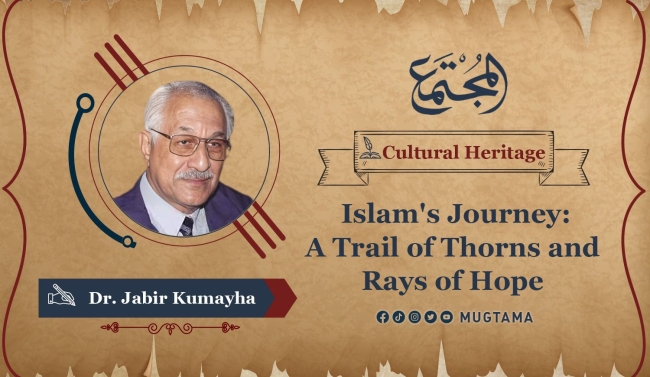Islam's Journey: A Trail of Thorns and Rays of Hope
There is no shortage of prevalent obstacles hindering the triumph of Islam and the adherence to comprehensive Sharia principles, posed by secularists and enemies of Islam and those who follow their path.
This is due to various factors, among which the most crucial are:
- The wave of Westernization dominating the intellectual landscape in Arab and Islamic nations, commonly referred to as the intellectual invasion. I believe a more precise term would be “spiritual invasion,” which includes intellectual, doctrinal, political, military, linguistic, historical aspects, and more.
This is the current reality the nation is facing, where Westernization is keen on casting doubt on the religious and cultural heritage aspects of the nation.
- Ignorance among those in charge of the affairs of the people regarding the true essence of resorting to Sharia. They view it as a threat to their governance, approach, and positions of leadership over the masses.
- The perception of Islamic governance is flawed, as it is viewed merely as the application of Hudud (punishments) such as stoning for adultery or cutting the hand of a thief. It is well known that these punishments are exceptions, and Islamic principles emphasize avoiding doubts in applying punishments. It is better for a judge to err on the side of leniency than to err in imposing a punishment. The application of punishments can only be realized through the prevalence of justice among the subjects, without discrimination based on class. We know how the Prophet Muhammad, peace be upon him, implemented the punishment on a woman from a noble tribe, Fatimah al-Makhzumiyyah, stating his famous words: “By Allah, if my own daughter Fatimah had stolen, I would have cut off her hand.”
- Islam emphasizes that rulers should set a good example for their subjects in their eating, drinking, and clothing and are not supposed to surpass their subjects. Unfortunately, many in authority consider this a diminishment of their dignity and a compromise of their prestige.
- Sadly, the Islamic world is burdened with groups of scholars known as “scholars of authority” who compromise their principles in their religious rulings, seeking the approval of the ruler rather than Allah! They issue rulings to please the ruler rather than based on what is just. It’s as if they address the rulers: “If there is no anger against us from you, then we do not care!”
These barriers, both internal and external, possess strong potential, especially in material, propagandistic, and media aspects.
I believe overcoming these barriers should rely on two types of plans:
- Urgent plans.
- Long-term strategic plans which are to be handled by legitimate governmental and popular institutions recognized for their trustworthiness and sincerity in dealing with Sharia and the people. The key figure in this field should be a knowledgeable personality with comprehensive knowledge of Sharia and contemporary sciences. A significant number of those individuals should also be proficient in foreign languages. As I mentioned, this effort requires strong collaboration throughout the entire Islamic world.
The work should cover multiple aspects, primarily starting with correcting misconceptions and refuting false accusations attempted by enemies of Islam against it. It should also present Islamic values and principles, illustrating their relevance to current issues in politics, society, education, and more.
There are promising signs that revive our spirits with hope, indeed, with a confident belief that the future will be dominated by this religion.
The most significant of these promising signs, in my view, is the wave of true religious revival engulfing the youth in our current time, commonly referred to as the “Islamic awakening,” especially among young women. Additionally, there is a growing interest in studying religious sciences, particularly in the fields of politics, sociology, and education. We must not overlook the fact that one of the driving forces behind this is a reaction to the failure of various political and social systems and ideologies prevalent in the world.
Among the most effective means and mechanisms in this field are:
- Emphasizing the study of Islamic religion as a fundamental subject at all educational levels with a practical and applied approach, particularly focusing on the values of jihad, construction, and unity.
- Making Arabic language a core subject at all levels of higher education, even in practical colleges that may seem unrelated to teaching the Arabic language. This is because Arabic is not just a linguistic subject; it is the vessel of religion and the Quran, the language of heaven.
- Parents ensure they set a good example for their children at home.
- Media outlets committing to promoting these values and avoiding the moral decline currently observed within them.
To sum up:
I say to the rulers and scholars of this nation: Fear Allah in your actions and decisions and seek His satisfaction in every step you take.
I say to the youth in particular: You must read extensively, explore a wide range of heritage sciences, and keep up with the developments happening in various fields now, as one of the most significant conflicts in the world is the scientific struggle.
We were once leaders in these fields when we adhered to our religion, but now we only pick up their crumbs.
We must be filled with hope and never despair. A journey of a thousand miles begins with a single step. Muslims do not know despair or hopelessness. In Allah’s will, we will triumph as long as we cling to our Quran, follow the Sunnah of our Prophet, and adhere to the path that our Prophet Muhammad, peace be upon him, left us upon, a path from which only the doomed deviate.
------------







